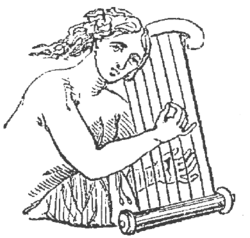|
The '''nevel''' was a ] in use by the ancient ]. The Greeks referred to it as the ] (νάβλα, cf. Latin ''nabilium'').<ref>Rich, Anthony. ''A Dictionary of Roman and Greek Antiquities.'' New York: D. Appleton & Company. 1874. Page 439.</ref> Much conjecture has been put forth on its exact nature, but it was probably not a standardized instrument. Most hold it to be a form of ], ], or psaltery. The ] renders the word into English as ] or ], and the ] renders it ]. The word "nevel" means ] in modern ].<ref>Neil, James. ''Everyday Life in the Holy Land.'' London: Cassel & Company, Ltd. 19134. Page 218.</ref> |
|
The '''nevel''' was a ] in use by the ancient ]. The Greeks referred to it as the ] (νάβλα, cf. Latin ''nabilium'').<ref>Rich, Anthony. ''A Dictionary of Roman and Greek Antiquities.'' New York: D. Appleton & Company. 1874. Page 439.</ref> Much conjecture has been put forth on its exact nature, but it was probably not a standardized instrument. Most hold it to be a form of ], ], or psaltery. The ] renders the word into English as ] or ], and the ] renders it ]<ref>Neil, James. ''Everyday Life in the Holy Land.'' London: Cassel & Company, Ltd. 19134. Page 218.</ref>. The word "nevel" means ] in modern ]. |
